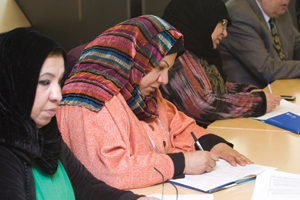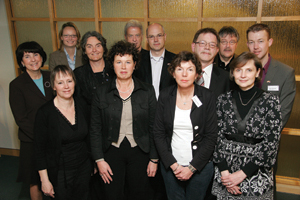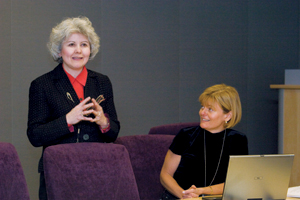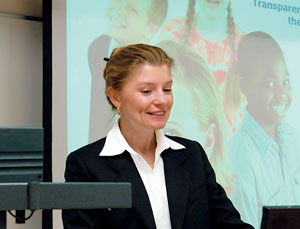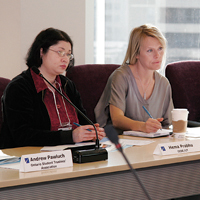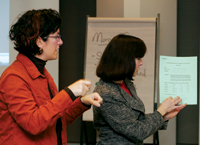|
|
Internationally educated teachersCollege tells Senate:Ontario teaching profession welcomes newcomers but job market poses a challengeA robust supply of qualified teachers in Ontario provides a much greater challenge to internationally educated teachers (IETs) looking for work than does the licensing process, College officials told the Standing Senate Committee on Human Rights in March. Invited to appear before the committee in Ottawa, College Deputy Registrar Lise Roy-Kolbusz highlighted the College’s efforts to expedite licensing for qualified teachers immigrating to Canada. Frank McIntrye, author of the College’s annual Transition to Teaching study, provided an overview of job prospects for Ontario teachers. The committee also heard from Marie Crowther, Registrar of the BC College of Teachers. The College of Physicians and Surgeons of Ontario was also invited to appear but sent a brief instead. The Senate committee asked the colleges to appear as part of its study of employment equity issues within the private sector and the federal public service. Thanks to several proactive initiatives to remove potential barriers, acquiring an Ontario teaching licence is no longer the hurdle it once was, Roy-Kolbusz told Senators Raynell Andreychuk, Jim Munson, Donald Oliver, Vivienne Poy and Yoine Goldstein. The Ontario College of Teachers, through its partnership in Teach in Ontario, provides personalized support in English and French to IETs at consultation centres in Toronto, Windsor and Ottawa, along with help to obtain documents, English-language upgrading courses and a six-week employment preparation program. The Deputy Registrar noted as further support the extensive information for immigrant teachers on the College’s web site and at monthly meetings the College hosts, and the visits it makes to settlement centres and community agencies to explain the registration process. “We have just concluded a comprehensive review of our registration practices to ensure that we comply with Ontario’s new Fair Registration Practices Code,” she said. “There is always room for improvement, but we’re happy to say that a significant majority of respondents agreed – the College’s registration practices are transparent, impartial, objective and fair.” But working as a teacher in Ontario is a two-step process, she noted. First you have to become a member of the College. Then you have to find a job. “We are currently in the midst of an oversupply of English-language teachers in this province,” McIntyre told the senators. Only one in 12 – or eight per cent – of new Canadian teachers who answered College surveys last year found regular teaching jobs in Ontario’s publicly funded schools in the 2006–07 school year. By comparison, 40 per cent of the grads from Ontario’s education faculties secured teaching positions. McIntyre pointed out that new Canadian teachers are highly experienced, most having taught in other countries prior to qualifying for their teaching licences in Ontario. All met language proficiency requirements. “Many of these teachers tell us that their experience and success in teaching in other jurisdictions is not recognized when they apply for teaching jobs in Ontario,” he said. “They seek opportunities to be in classrooms and to demonstrate that they can make this transition to Ontario schools.” Senator Munson asked, “Is there systemic racism within the teaching community in Ontario?” “I believe that Ontario educators bring nothing but the best intentions, and make very good-faith efforts,” McIntyre said. “They are selecting from a very large number of applicants based on the best evidence. They are looking at bona fide requirements for the jobs and making best efforts to make the appointments based on those.” visitorsDelegations visit the College to share and gather information on a range of education issues, including accreditation, qualifications and standards of practice.
CyberbullyingLaws to ban cyberbullying raise concernsEfforts to ban cyberbullying in the US have been criticized by civil libertarians worried about restrictions on freedom of speech. About a dozen American states now have anti-cyber-harassment legislation, while a handful of others at press time were considering following suit. One of those is Missouri, where 13-year-old Megan Meier hanged herself in her closet in October 2006, after receiving hurtful messages from someone she thought was a boy. However, the boy did not exist. The messages on Megan’s MySpace page came from a neighbouring family. Nevertheless, authorities decided there were no grounds for legal action following the suicide. “The solution to offensive online speech is not the knee-jerk reaction of saying it should be banned,” says American Civil Liberties Union lawyer James Tucker. “Rather, the need for greater consumer awareness is highlighted, as with any product available in a marketplace. “Parents, not the government, are best positioned to police the web sites and content that their children access. The only way for the Internet to remain a true marketplace of ideas for the 21st century is to continue to promote the free exchange of information and speech, with the understanding that online speech can be as beneficial or as hurtful as speech occurring offline.” Izzy Kalman, a respected US bullying expert, agrees and worries that efforts to restrict free speech in the guise of protecting children are eroding individual freedoms “as our country becomes a growing police state.” There are other legal concerns, such as the right of a school to monitor a student’s private life. “The lines between home and school continue to blur, with more expectation for schools to exercise authority in areas previously reserved for parents,” says Max Riley, a school superintendent in New Jersey, which permits schools to discipline students for cyberbullying that occurs away from school if it substantially disrupts school activities. Ontario has adopted a similar approach. New regulations under the Safe Schools Act that came into effect on February 1, 2008, allow schools to suspend or expel students for off-site cyberbullying that has an “impact on the school climate.” It specifically includes student online bullying of teachers and other staff as potentially punishable offences. La Francophonie
BC College of TeachersNew professional standards win supportThe BC College of Teachers has adopted new professional standards, approved in March, to replace a similar professional code dating from 2004. “We are gratified that our partner groups, from Aboriginal educators to vice-principals, participated in the process and endorse the results,” says BC College Chair Richard Walker. A Grade 5 teacher in Courtenay on Vancouver Island, Walker adds that the new criteria “reflect aspirations of the teaching community that everyone can agree on.” Specifically, he points to the first three of the eight standards that establish the appropriate relationship between a teacher and students. “It should be nurturing,” he says, “and the standards go on to outline professional expectations of what is fundamental for a teacher to be effective in the classroom.” The guidelines call upon all educators to treat students with respect and dignity. Further, educators are expected to be ethical role models who are knowledgeable about how children develop as learners and as social beings. Other standards deal with an educator’s relationship to families and the community, the need to have a broad knowledge base and the expectation that educators will engage in career-long learning and contribute to the profession. It took the BC College some three years of broad consultation and revisions to develop the current set of criteria. The process began with a two-day forum that brought together representatives of all key stakeholders: teachers, trustees, school principals and vice-principals, parent groups, superintendents and Aboriginal educators. Drafts went back and forth several times until final agreement on wording was reached. “Every partner group participated, and the College responded to the widest degree possible,” says Walker. The new standards establish a framework for assessing teachers’ conduct and competence while also providing a benchmark for the professional training required to become a certified teacher. BC’s revised standards can be found at www.bcct.ca Look for more on professional standards for teaching in future issues of Professionally Speaking. Criminal codEAmendments raise age of sexual consentCanada’s decision to raise the age of consent to 16 will come as welcome news to College members. In 2006, during the annual State of the Teaching Profession Survey, members overwhelmingly supported proposed amendments to the Criminal Code to raise the age of consent for sexual activity to 16 from 14. The amendments were passed into law in February. Countries around the world recognize “age of consent” as the age of sexual maturity. In Canada, age of consent refers to the age at which the criminal law recognizes the legal capacity of a young person to consent to sexual activity. For young people under the age of 16, all sexual activity – from sexual touching to intercourse – is prohibited, with some exceptions. These exceptions are based on age proximity. For example, young people between the ages of 14 and 16 are allowed to have consensual sex with a partner who is less than five years older, provided that older person is not in a position of trust or authority. For young people between 12 and 14, consensual sex is permitted only with a partner who is less than two years older. There can be no consensual sex for children under the age of 12. The age of consent remains 18 for exploitative sexual activity involving prostitution, pornography, or where there is a relationship of trust, authority or dependency. Proponents argued that the legislation will help keep minors safe from pimps and sexual predators on the Internet. While changes to the Criminal Code raise Canadian standards, they will have no bearing on professional misconduct matters, says Dave Leonard, a partner with McCarthy Tétrault, legal counsel to the College. “We have higher standards than the Criminal Code,” says Leonard. “Sex between teachers and students is never acceptable, regardless of their respective ages.” For legal, ethical and professional guidance, consult the College’s Professional Advisory on Professional Misconduct. International exchangeTeacher’s Czech exchangesGeorge Sykora is single-handedly building closer ties between schools in Ontario and the Czech Republic – a relationship he hopes will be endorsed by the provincial government. Sykora, who fled the former Czechoslovakia for Canada after the 1968 Soviet invasion, has secured the Czech Republic’s approval for a memorandum of understanding promoting exchanges between the two jurisdictions. “Any time teachers can discuss their profession with colleagues from other cultures, it benefits everyone,” says Sykora, a technology and skilled trades teacher at Sudbury SS. “I hope this will enhance what teachers do, but I want them to have fun with it.” Sykora returned earlier this year from a seven-month visit to the Czech Republic, where he met with government and school officials. He is beginning to organize exchanges after finding Czech schools willing to place Ontario students in their co-op programs and to send their vocational students to Ontario to sharpen their skills. Says Sykora: “Czech students are also keen to improve their English, but we have lots to learn from what is a very successful academic system.” To sign up students as pen pals or for other initiatives, visit Sykora’s web
site. Home and School
postal ratesLibrarians enlist MPs’ supportThe Canadian Library Association (CLA) lobbied MPs in April to stabilize and extend Canada Post’s helpful library-book rate. The rate, unchanged since 2005, allows approved libraries to ship and receive books at less than 10 per cent of the normal rate. The College library takes advantage of the discounted rate to provide members with the outgoing and return mailing of books, free of charge. Currently, Canada Post implements the special rate on a year-to-year basis. The CLA wants the federal government to make the rate permanent. It also wants the rate, now restricted to books, to include audiovisual and other educational materials. The changes will become law if Manitoba backbencher Merv Tweed has his way. The Brandon-Souris MP has introduced a private member’s bill, Bill C-458, which has the full backing of the CLA. Meanwhile, the College’s library technician, Olivia Hamilton, reports that members borrowed nearly 12,000 items from the Margaret Wilson Library in 2007, mostly by mail. TFOOntario’s French-language television station on its ownThe Ontario government has taken the next step toward full autonomy for TFO, proposing to make the French-language educational television station permanently independent of its sister station TVO. “TFO is a great cultural resource for the community,” said Education Minister Kathleen Wynne when introducing the legislation in April. “And we want to make it stronger. “TFO provides important resources that meet the unique needs of francophone students,” she said, adding that permanent independence is intended to allow for that continued support to francophone students, parents and teachers. The French-language public television corporation, which moved to its own location on College Street in Toronto this January, currently operates independently of TVO under an order-in-council that expires next year. The new bill will establish permanent operational and budgetary independence from TVO. TFO currently receives $15 million annually from the Ontario government. In addition to its television service, the network reaches 90,000 students in their homes and classrooms through its web-based SOS devoirs (homework help) program, found at tfo.org. Olympic hopefulToronto teacher goes for gold this fall
Victoria Nolan and her guide dog Angus with students at Gledhill PS Victoria Nolan is a pioneer in her Toronto classroom. She is one of the few legally blind teachers in the Toronto DSB and the only one to use a guide dog. Now she hopes to blaze new paths outside the classroom as well. This September, Nolan will be in China where she hopes to show her prowess as a rower. When asked about her goal for Beijing, she laughs. “Of course, it’s to win gold!” Nolan will compete for Canada at the Paralympics – the top global event for athletes with disabilities – that takes place just after the Olympics come to a close in many of the same venues. It’s an incredible achievement for Nolan who, as a young student, hated gym class because she would trip over things and was considered clumsy. “I spent a lot of time feeling stupid,” Nolan remembers. “I’d be trying to find the ball and next thing it hits me in the face, and everybody’s laughing. It was just torture.” It wasn’t until she was 18 that she was diagnosed with an eye disease called retinitis pigmentosa, which meant she was losing her eyesight over time. She got the news in her second year of university while studying to become a teacher. Though she didn’t realize at the time how serious her vision problem was, she also did not consider it an obstacle. “I’ve wanted to teach since I was five years old,” she says. Nolan has no peripheral vision and can only see things that are magnified and up close. That posed challenges when she got involved in rowing a few years ago, a sport where athletes have to be in sync to push the boat through the water. “You’re following the person in front, and I wasn’t able to see what they were doing.” The solution: She was moved to the front of the boat so everybody followed her lead. And it paid off. Last year, she was a member of Canada’s adaptive rowing team, which won a bronze medal at the world championships in Munich. Nolan now speaks about her achievements in sport to her students at Gledhill PS, where she teaches Special Education. “I think it’s great for them to have a teacher who has a pretty significant disability,” she says. “There’s a huge message for them, especially because, being Special Ed students, they feel that they can’t do things.” Nolan says the children are not always happy to be pulled out of their classes and put into hers. But she tries to be a role model. They often see her working out with a personal trainer after school. “And I’m doing everything I want to do – teaching and rowing.”
Nolan’s success in sports has helped her gain confidence to lead in other ways. She spoke at a recent equity forum for high school students. She wants to address the lack of information in schools about disability issues. “That’s the path I want to go on – to speak to students and teachers and educate them about disabilities.” While, in anticipation of summer’s events in Beijing, students at many schools are studying the Olympics this year, Nolan plans to explore the history and events of the Paralympics with students in her school. And in September, she’d like nothing better than to bring back a medal for show and tell. Consultations
homeworkTDSB to implement new family-friendly homework policyThe province’s largest school board will implement a new homework policy in September, based on the principles that homework should only cover material taught in class and involve “clear, purposeful and engaging activities.” The Toronto DSB’s more family-friendly policy is, in part, a response to complaints by students and parents about children staying up late to complete work, ruined holidays and inconsistency among schools over amounts assigned. The policy update follows the board’s publication of its survey of 105,000 Grades 7–12 students, showing that students were spending more time than recommended on homework and that students from immigrant families were disadvantaged because it was more difficult for parents to assist them. Under the new policy, the 10-minutes-per-grade standard is gone. Kindergarten students will no longer be assigned homework, except for activities like reading with or talking to their parents. Students up to Grade 6 will receive minimal homework, except for activities like playing games, having discussions or cooking with family members. Grades 7 and 8 students will be assigned no more than one hour a day of homework and secondary students no more than two. No one will have homework over March Break, Christmas or other holidays. Teachers must now assign homework in blocks so students and families know what’s coming up and can plan to complete it. Parents will be encouraged to support homework completion and also to make sure that children go to bed on time, even if their homework is not all done. Highlights of the new policy and a downloadable document with details on the proposed and revised policy, the conultation process, the homework survey questionnarie, a bibliography and more are available on the Toronto DSB web site. Technology contestFour Ontario students advance to final roundStudents from Don Mills CI were named regional winners in the 2008 ExploraVision Awards and advanced to the final round of one of the world’s largest student science and technology competitions. The annual competition encourages students to imagine technologies to improve the quality of life that could exist in 20 years. Coached by their teacher Monica Segall, the Grade 11 finalists – Kyle Chin, Yiwei Hu, Alexander Martin and Tony Wang – envisioned the Cervical Analysis Test as an early detection mechanism that could help women pre-test for life-threatening cervical cancer and treat it early. Participating students work in groups of two, three or four, just like a real research and development team. The program evaluates American and Canadian contestants in six regions and at four levels – kindergarten to Grade 3, Grades 4 to 6, Grades 7 to 9 and Grades 10 to 12. As one of 24 regional winners selected from the 4,527 submissions, the Toronto team’s school was awarded a notebook computer. Students on the four first-place teams will each receive a savings bond valued at $10,000 at maturity, while students on second-place teams will each receive a bond valued at $5,000 at maturity. The coach and mentor of each finalist team will be invited to attend the awards ceremony in Washington, DC in June. Announcements will be made as this issue goes to press. To see results and for more information visit www.exploravision.org or e-mail exploravision@nsta.org. The 2009 ExploraVision entry material will be available in mid-August 2008. Resources for students, teachers and parents are currently available online. ContestClassroom make-oversEmery Collegiate Institute in Toronto, Port Royal Public School in Scarborough and St. Anthony Catholic Elementary School in Thornhill were finalists in the national 2007 Expo Classroom Makeover Contest this spring. Each school was awarded up to $2,500 worth of classroom supplies, and students who submitted the winning proposals each received a cheque for $500 to be used towards an education savings plan. For the 2008 contest, both teachers and students may submit a 100-word letter or essay describing how they would redesign their classroom, along with a photograph of the classroom, for a chance at the grand prize makeover valued at $15,000. For complete contest rules visit www.expoclassroommakeover.ca. Entries may be submitted online or by mail until November 30, 2008. Consultations
Raising Funds
Contest winnersThree rewarded for eco-actionThree Ontario students were recognized as regional champs for their innovative environmental initiatives in the first national Sunlight Eco-Action Kids Awards this year. The program celebrates children’s involvement in reducing their environmental footprint for future generations. Eco-minded students submit a letter that describes the actions they take to better the environment. Ontario students from Holy Spirit Ukrainian Catholic School in Hamilton, CD Howe Public School in Thunder Bay and St. Aloysius School in Stratford were regional winners. Each won a green-coloured iPod shuffle with solar charger. The Ultimate Eco-Action Kid title is awarded to a participant in each of three age groups – six to seven years, eight to nine years and 10 to 12 years. Experts from key environmental organizations act as judges and the national winners each receive $1,000 cash plus $1,000 to donate to the environmental charity of their choice. For more information visit www.sunlightecoactionkids.ca. Notable DatesJUNE20 – World
Refugee Day 21 (to July 1) – Celebrate
Canada! 27 – Canadian Multiculturalism Day JULY1 – Canada Day 19–27 – National Drowning Prevention Week AUGUST9 – International Day of the World’s Indigenous People 23 – International Day for the Remembrance of the Slave Trade and Its Abolition SEPTEMBER8 – International Literacy Day 14–21 – AIDS Walk for Life Week 21 – International Day of Peace 26 – Terry
Fox National School Run Day For other international observances visit www.un.org, or try www.unac.org |














